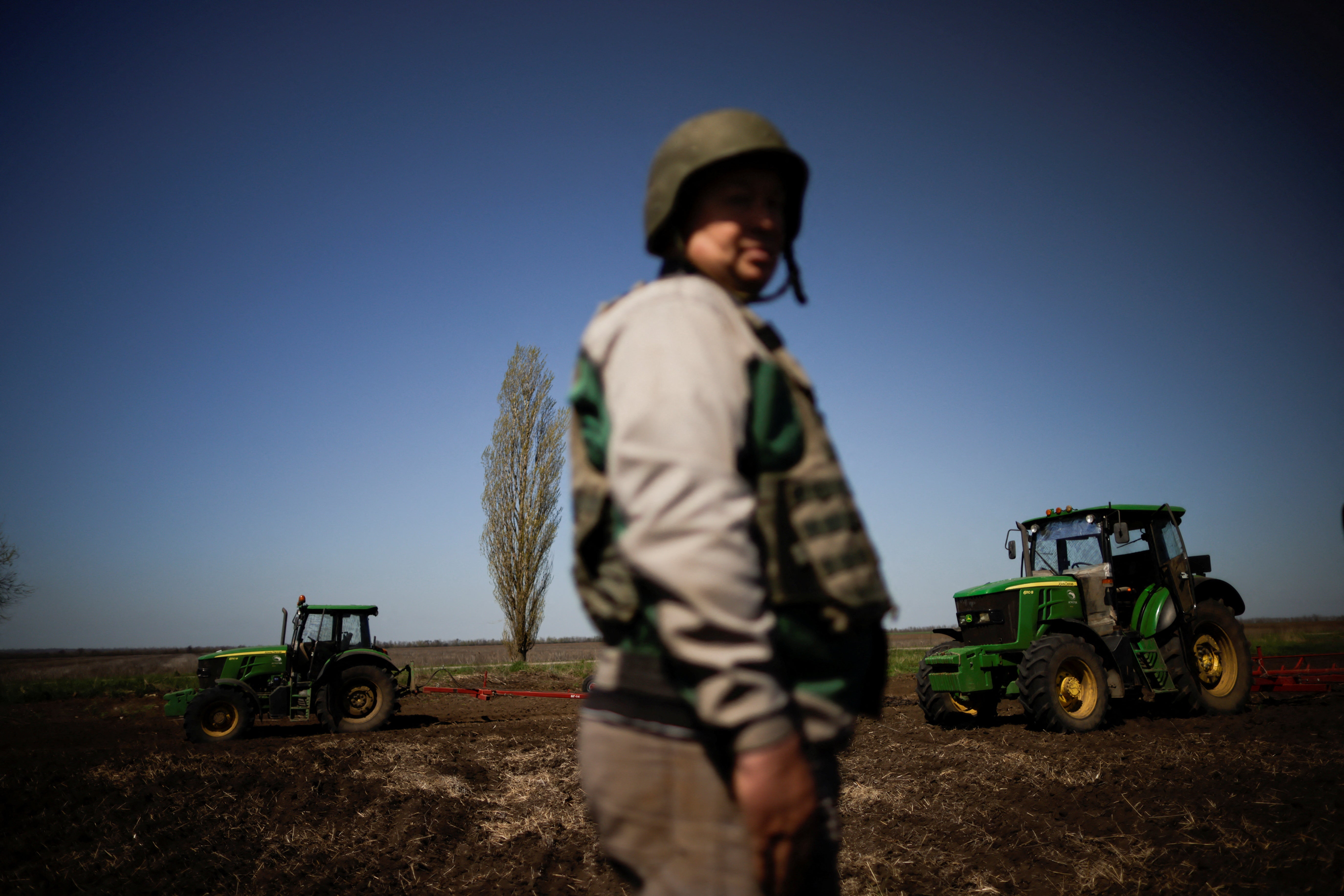The Russia-Ukraine grain deal isn’t enough to halt a spiralling global food crisis
I spent the past three weeks criss-crossing war-ravaged Ukraine, talking to farmers under shelling and missile fire, writes Bel Trew


The deal was heralded as the breakthrough solution to looming world hunger, and the feared conflict and even mass migration that could follow in its wake. But less than 24 hours after the Turkish-brokered agreement to open Ukraine’s blockaded Black Sea ports was signed, Ukraine said Russia had bombed Odesa. Again.
The Black Sea port is the country’s largest and most important, and was the main focus of the deal to restart Ukraine’s stuck grain exports, a move which would help curb soaring global food prices. Under the terms of the agreement, a joint coordination centre staffed by members of the parties was to be set up to monitor ships transiting the Black Sea to Turkey’s Bosphorus Strait, and off to world markets. All sides agreed on Friday there would be no attacks on these entities.
And so, bombing Odesa just a day later throws the entire deal into question and shatters any grains of trust on the Ukrainian side.
Kyiv said the missiles were fired from Russian warships near Crimea and they “spit in the face” of the UN’s chief and the Turkish president who helped broker the agreement. Ukrainian president Volodymyr Zelensky called it blatant “barbarism”.
The UN, EU, US, Britain, Germany and Italy have condemned the attacks. Turkey’s defence minister said Russian officials had told Ankara that Moscow had “nothing to do” with the strike. So far publicly, the Kremlin has been silent about the bombardment. But this firmly underlines the fact that this issue cannot be fixed with an export agreement.
The inability to export Ukraine’s grain – and issues with Russian exports amid sanctions – has indeed dealt a blow to the world. Before Putin’s invasion, Ukraine exported as much as six million tonnes of grain, cereals and vegetable oils per month, as one of the main world suppliers of the West.
In fact, the country feeds around 400 million people worldwide. But since February it has only managed to export 3 million tonnes in total.
Russia and Ukraine are major global wheat suppliers, and war has choked supply chains, contributing to pushing up the price of goods such as wheat by 60 per cent. The World Food Programme said it is expected that the situation will drive some 47 million people into "acute hunger”. UN chief Antonio Guterres has warned the war in Ukraine threatens to unleash “an unprecedented wave of hunger and destitution, leaving social and economic chaos in its wake”.
As grain storages were been bombed or swallowed up into frontlines and occupied territories, Ukraine didn’t have the capacity to hold the tens of millions of tonnes of grain stuck in the country. They couldn’t sell or shift last year’s harvest, they couldn’t store this year’s harvest, and the economic crunch from that would mean next year’s harvest wouldn’t even be sowed. And so the deal would technically allow exports to happen, easing the crisis.
But while the world heaves a sigh of relief, it isn’t the cure. The main cause of this crisis – Russia’s invasion of Ukraine – has not been resolved.
I have spent the past three weeks criss-crossing war-ravaged Ukraine, talking to farmers under shelling and missile fire, and to agricultural officials, grain traders, agrarian holding companies and union chiefs in Donbas, Kharkiv, Dnipro and Kyiv. The resounding message was that until the war is over, until all of Ukraine’s ports are returned to Ukraine and de-mined, until the Black Sea is no longer in the chokehold of Moscow in any way, until lands are returned to their owners, until infrastructure is fixed, until all the unexploded ordnances are removed from the fields – there is no true solution.
As Markian Dmytrasevych, Ukraine’s deputy agriculture minister, said when I asked him about the deal: “The best and only solution is to defeat Russia, and then de-mine the ports. Until that happens, this is a global problem.”
In a somewhat eerily accurate prediction before the deal was signed, Hryhoriy Nemyria, a former deputy prime minister and now chairman of the foreign affairs committee of Ukraine’s parliament, told me the Ukrainians feared “Russia may use these talks not just to buy time [to regroup] but, for example, to attack Odessa”.
“Fear is high and trust is low,” he told me in Kyiv last week. Mr Nemyria said Moscow’s continued shelling of grain storage sites and farms across the country, stealing grain and illegally smuggling it to third countries, meant that the credibility of any Black Sea deal was massively undermined.
“I’m worried this is an ad-hoc solution that will be used as leverage by Russia to get privileges like limiting Ukraine’s defence of its seashore or inspecting ships to prevent accumulation of weapons,” he added. “Russia is using the food crisis and the threat that it causes in its favour. “
But distrust is not the only issue. While grain exports are a major part of Ukraine’s grain problem, the ongoing fighting is also a huge factor.
Farmers and agrarian companies I met said they were unsure how they were going to harvest or sow as their lands were on the frontline or in occupied territories, their equipment had been bombed, mined or stolen, or their grain storages missiled and torched, all while the cost of items such as fertiliser in the war had risen five-fold. The price of wheat internally has sunk by more than half, but the cost to produce it has tripled – issues that easing exporting won’t completely resolve.
In Donbas, the field next to us was shelled as we conducted an interview with one farmer. In Dnipro, a missile was shot down over our heads as farmers harvested in the background, ramming home the very real logistical nightmares they are going through.
But those farmers could at least still access their lands. In Kyiv, I spoke to the head of HarvEast, one of Ukraine’s largest agrarian holding companies, who told me that 70 per cent of their fields (90,000 hectares) was now in occupied territory or engulfed by the front line. They had no idea where more than 1,000 members of their staff were – as the majority live in now-occupied cities such as Mariupol. They have no idea how to reclaim their lands, or equipment, seed or grain stores. Opening Odesa port to export grain, to them, is pointless.
In fact, Mr Dmytrasevych told me that a quarter of Ukraine’s agricultural land is now inaccessible or unusable because it is under occupation by Russian-backed forces, mined or located near the many front lines.
He said that, meanwhile, this direct damage to the agriculture sector – such as destroyed equipment and warehouses as well as mined fields – has cost the country $4.5bn (£3.8bn). Indirect damage, such as the decrease in production, the disruption to logistics and plunging prices for export, could amount to as much as $20bn (£16.9bn).
The ability to shift grain through Odesa may ease some of that, but ultimately it won’t cover all the damages to the agricultural industry, and it won’t return Ukrainian land back to its farmers or fix equipment.
And so Mercy Corps warned that while ending the grain blockade is welcome, “this will not end or significantly alter the trajectory of the worsening global food crisis”. The problem also goes beyond Ukraine and Russia. “Unblocking Ukraine’s ports will not reverse the damage the war has wreaked on crops, agricultural land and agricultural transit routes in the country,” Mercy Corps’ chief executive officer Tjada D’Oyen McKenna said on Friday.
To keep up to speed with all the latest opinions and comment, sign up to our free weekly Voices Dispatches newsletter by clicking here
“It will not significantly change the price or availability of fuel, fertiliser, and other staple goods that are now beyond the reach of many, particularly in lower-income countries; and it will certainly not help the majority of the 50 million people around the world inching closer to famine stave off starvation.”
She said this is because the global food catastrophe goes far beyond the 20 million tonnes of grain that have been stuck in Ukraine. She pointed to the spike in fuel prices (caused in part by the war) which is driving up the cost of staple goods across nearly every country where Mercy Corps operates.
In parts of Somalia, where hundreds of thousands of people are on the brink of famine, she said the global organisation has seen the price of cooking oil, beans, rice, sugar and flour nearly double since the start of the Ukraine conflict, and fertiliser prices have increased by 75 per cent. In northwest Syria, food prices have increased by nearly 70 per cent. Global food systems are also struggling because of the economic downturn post-Covid, and the impact of climate change.
In short, urgent action has to be taken beyond a grain deal which Russia is undermining by continuing to missile Ukraine’s ports and farming infrastructure, by continuing to occupy a quarter of Ukraine’s agricultural land and – according to numerous reports – by continuing to steal and sell Ukrainian grain.
Ensuring that Ukrainian grain can be exported through its ports is step one in an urgently needed global plan to stop worsening world hunger – but it is not the solution.
Join our commenting forum
Join thought-provoking conversations, follow other Independent readers and see their replies
Comments


Bookmark popover
Removed from bookmarks